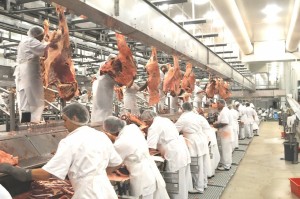Texas A&M investigators are part of a research effort working on ways to inhibit the growth of Shiga-toxin producing E. coli (STEC) on beef.
Carolina Gonzalez, a graduate student at TAMU, studied the use of fermentative microorganisms to produce natural antimicrobial compounds that can inhibit the growth of STEC on beef top sirloins.
 Using this methodology, Gonzalez was able to reproduce the production of lactic acid by these organisms on beef surfaces during product aging, which will help producers understand how the non-pathogenic microorganisms can inhibit the growth of pathogenic microbes on major pieces of beef before preparation.
Using this methodology, Gonzalez was able to reproduce the production of lactic acid by these organisms on beef surfaces during product aging, which will help producers understand how the non-pathogenic microorganisms can inhibit the growth of pathogenic microbes on major pieces of beef before preparation.
Tamra Tolen, a Ph.D. student, studied the ability of different plant-derived, antimicrobial essential oils such as clove and oregano to not only to restrain the growth of STEC on ground beef, but also exhibit antimicrobial properties. Such essential oils are identified as generally safe by the U.S. Food and Drug Administration and U.S. Department of Agriculture Food Safety Inspection Service, and may be particularly relevant in both beef transportation and retail.
The results of the new research will be presented at the 2014 Governor’s Conference/STEC CAP Annual Conference May 27-29, in Lincoln, Neb. Attendees at the conference will also discuss progress in prevention and control of microbials. “The Texas A&M AgriLife Research team is pleased to have the opportunity to collaborate with such a prestigious research group working to help assure the safety of our food,” said Dr. Gary Acuff, director of the Texas A&M Center for Food Safety in College Station and one of the collaborative research team members.
 “The long-term goal of the project is to reduce the occurrence and public health risks from Shiga toxin-producing E. coli in beef, while preserving an economically viable and sustainable beef industry,” said Dr. Rod Moxley, project director from the University of Nebraska-Lincoln. “This can only be accomplished by a multi-institutional effort that brings together complementary teams of the nation’s experts whose expertise spans the entire beef chain continuum and then sharing the research findings through conferences such as this.”
“The long-term goal of the project is to reduce the occurrence and public health risks from Shiga toxin-producing E. coli in beef, while preserving an economically viable and sustainable beef industry,” said Dr. Rod Moxley, project director from the University of Nebraska-Lincoln. “This can only be accomplished by a multi-institutional effort that brings together complementary teams of the nation’s experts whose expertise spans the entire beef chain continuum and then sharing the research findings through conferences such as this.”
Texas A&M is one of the 15 universities engaged in STEC research, which was funded by a five-year, $25 million grant from the U.S. Department of Agriculture.
